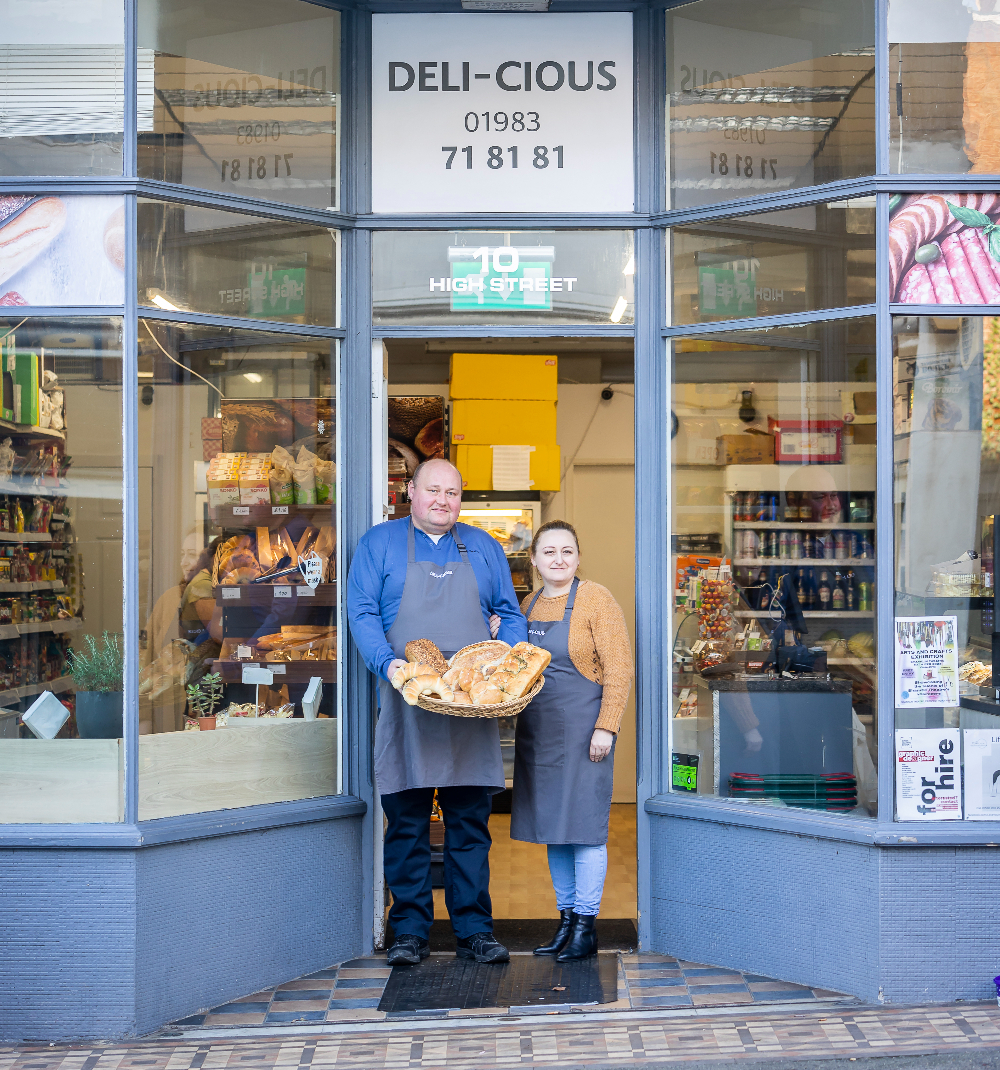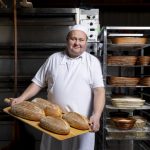This article originally appeared in the March/April 2023 edition of Style of Wight Magazine. Words by James Rayner. Photos by Julian Winslow and Christian Warren.
Eastern Europeans have been making the Isle of Wight their home since the days of Queen Victoria, when Czech and Hungarian waiters served in a Ventnor hotel and a Polish dentist named Arnold Pitowsky took over the keys to a house in Shanklin. Today, they’re a sizeable, skillful and often entrepreneurial part of our community, with many achieving big things in the local food and drinks sector. So, wanting to find out more, we sat down with some of our Eastern European friends to talk about their home, discover their stories and ambitions, and to see how they’re helping Isle of Wight food to advance and evolve.
Ruslan Ciobanu – Moldova
Owner, Da Vinci Mediterranean Bar & Restaurant, Newport
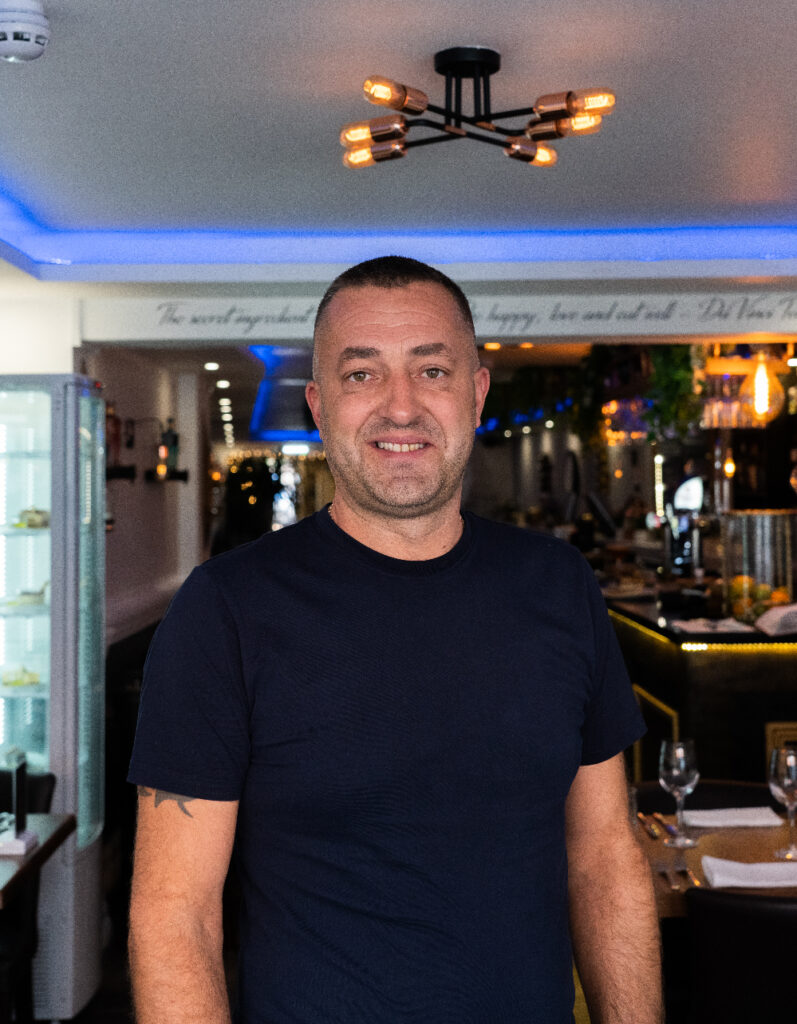
Ruslan Ciobanu always dreamed of having his own restaurant, and in 2021 (in the middle of a pandemic) his dream came true. “My missus said are you crazy? Opening a restaurant when everyone else is staying at home!” But, crazy or not, ever since it first opened its doors on Newport’s Holyrood Street, Da Vinci has been something of a local success story.
Born in the southern Moldovan town of Cantemir (close to the Romanian border), Ruslan is an agronomist by background (making him an expert in soil management and crop rotation). In 2005, during his last year of university in the capital Chișinău, he was sent to the Isle of Wight and Arreton’s Tomato Stall, to gain experience and learn. “When I arrived, I just loved this island, everything about it, so decided to stay”.
After 14 years as a field manager, growing asparagus at Brown’s Farm in Merstone, Ruslan decided the time was right to open his restaurant. Specialising in Mediterranean cuisine (which is surprisingly similar to Moldovan food), Da Vinci’s has become well-known for its succulent local lamb kleftiko and delicious bruschetta made with Isle of Wight tomatoes. Front-of-house are Ruslan, wife Rodica and daughter Elena, whilst in the kitchen are three chefs: two Romanians and a Brit.
Particularly exciting is the special Moldovan menu, available on selected Sundays, when diners can try everything from mămăligă (made from polenta, cheese and sour cream), to sărmăluțe (stuffed cabbage rolls) and păpănași cu brânza (cheese doughnuts, served with cream and jam). We’d also recommend the clătite cu stafide – pancakes stuffed with sweet cow’s cheese, raisins and a hint of cinnamon – something Ruslan can remember his parents making over forty years ago.
Piotr Banachowski & Justyna Banachowska – Poland
Owners, Deli-cious Delicatessen, Shanklin

Walking past the windows of Deli-cious Delicatessen in Shanklin, it’s hard not to be pulled in by the tempting selection of custard-filled doughnuts, layered honey cake and plum-stuffed pastries. Fresh from the oven, this unusual selection is the work of Piotr Banachowski, a talented master baker, originally from Inowrocław in Central Poland, where he studied professional baking from the age of 15.
Piotr first came to the Island in 2006 to take up a job at Grace’s Bakery in Ryde, arriving without a word of English (having learnt German and Russian at school instead). After a second job at Albert Cottage, he decided it was time to work for himself, taking over Number 10 Shanklin High Street in January 2018 and opening his artisan bakery and delicatessen two months later.
Stepping through the door today, you’re most likely to meet wife Justyna, who first came to visit Piotr on holiday in 2007 but falling in love with the Island’s natural beauty, decided to make it her home. After ten years as catering supervisor at Ryde School, she now manages the shop, ensuring the shelves are filled with Eastern European specialities including Romanian chocolate and Polish fruit tea. Initially customers were from the Island’s Bulgarian, Hungarian, Polish and Romanian communities, but an ever increasing number of Brits now come for their bread, cakes and pastries – as well as the Isle of Wight’s new Ukrainian minority too.
Piotr’s specialities include apple cake (based on a recipe from Justyna’s grandmother), Polish ‘WZ’ chocolate cake, jam- and custard-filled doughnuts (available every Saturday) and crescent-shaped bread rolls, traditionally dipped in yoghurt before eating. As they’ve grown, the kitchen has moved from the back of the shop, to the former Island Bakers unit in Lake Business Park, where with the help of new employee Grzegorz, they supply the deli, as well as a number of other businesses including Monkton Arts, Bembridge Farm Shop and It’s About Thyme.
Feras Al-Obaidi – Romania
Farm Manager, The Garlic Farm, Newchurch
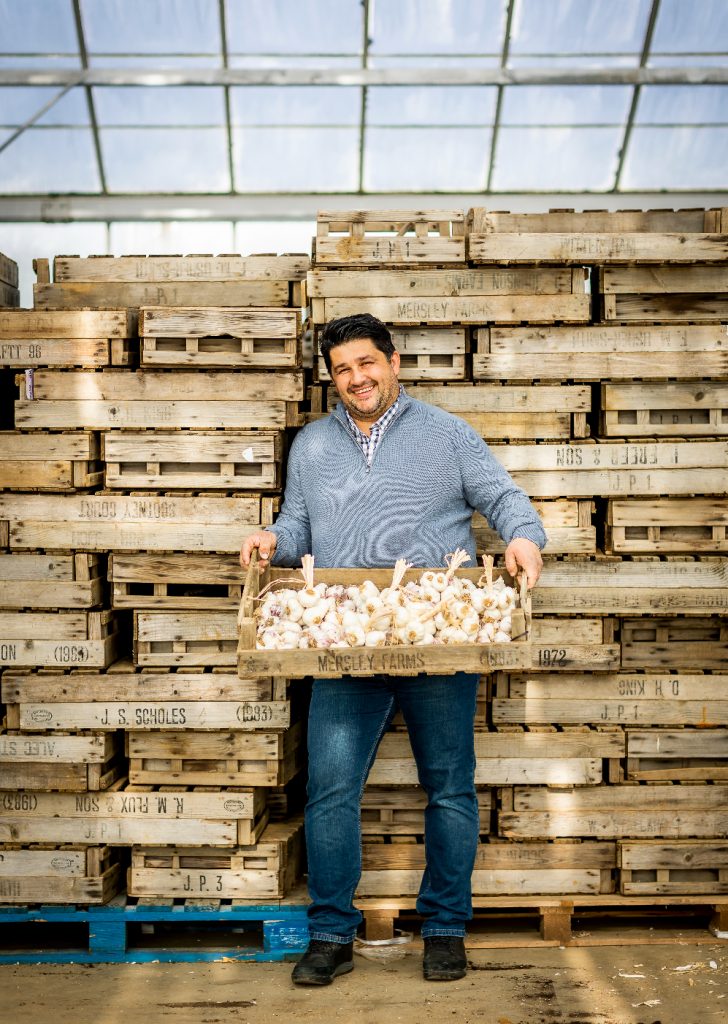
With an Iraqi father and a Romanian mother of Bulgarian ancestry, Feras Al-Obaidi experienced a unique mix of cuisines growing up in the Romanian town of Târgoviște, 80km northwest of the capital, Bucharest. However, garlic was never a major ingredient.
After studying maths and IT at high school, he became a professional wrestler aged 16, competing in France and Germany, before heading back to Romania to enrol at university. By 2005, Feras had decided to leave the country, applying to a Bucharest-based agency which found him a position on a farm in Herefordshire. When he arrived to sign the contract, Feras found there had been a mix-up – his job had been given to someone else and instead, he would be off to the Isle of Wight, to work at a place called The Garlic Farm.
Despite a four-year gap, (when he took on a demanding job selling diesel to farmers in
Romania) he’s worked in Newchurch ever since, starting as an asparagus picker, before moving onto garlic, later being promoted to the pack house and now ensuring the smooth running of activities as farm manager. Living in Lake with his wife and two children, he mans The Garlic Farm stall at monthly mainland farmers’ markets and has even represented the firm at the Hampton Court Flower Show. “I never knew there were so many different varieties and tastes of garlic until I came here, some are so mild and others have such a good kick.” Asked for his top tips on cooking with local garlic, Feras tell us he likes to mash the fresh bulbs, mix them with a little water and sprinkle over freshly cooked fish, or as an alternative, to mix it into a combination of natural yoghurt and chopped herbs (just like Greek tzatziki).
Dita Kristopaviciute – Lithuania
Co-Owner, Cantina Cafe and Kitchen, Ventnor
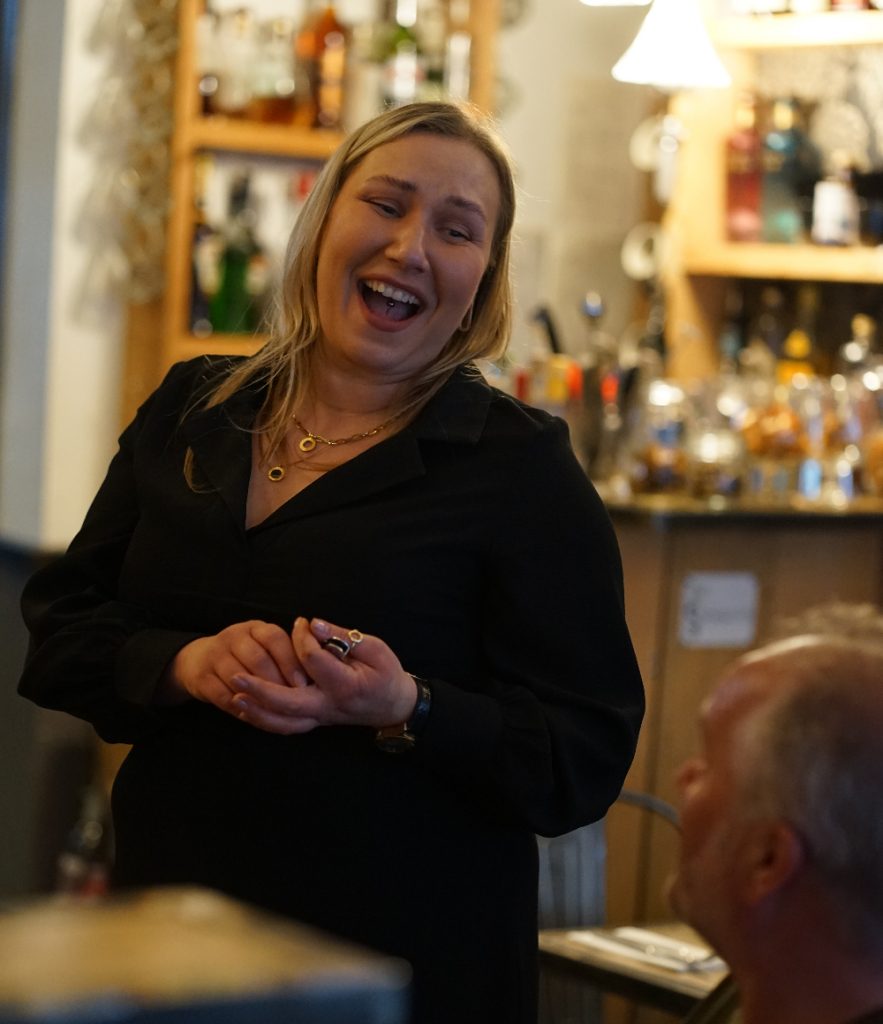
“I met my partner, Adam, through a mutual friend on Facebook, we started chatting and the rest is history” explains Dita, from the comfy banquette seating of Ventnor’s Cantina. However, being more than 1,000 miles apart (Dita in Lithuania and Adam on the Isle of Wight) a move was on the cards for one of them.
Growing up in the northern Lithuanian city of Šiauliai, food was a big part of Dita’s life. Her mum would make soups almost daily (including beetroot-based borscht) and every Sunday the family would drive to visit her grandma, famous for making cepelinai – traditional potato dumplings stuffed with either minced beef or curd and jam. “She made it so well, no one else would even dare to try!”
Then, in 2010, Dita moved to the Island to be closer to Adam “which took quite a bit of adjusting”. After working at The Wellington Hotel, The Royal and The Met, she was offered a position at Cantina in Ventnor High Street, and her love of food was reignited. “The owner Klaus was a big foodie himself and took me on business trips to London to see other food firms and show me what’s possible, it was really inspiring”. In 2021, Klaus gave Dita and Adam the opportunity to take over the business, a decision they’ve never looked back from.
Famous for both its coffee (from London roaster Square Mile) and its award-winning brunches, the dishes most frequently ordered at Cantina now include their smashed avocado on sourdough and their Full English. Suppliers are overwhelmingly local, such as Ventnor Butchers (for bacon), Harvey Brown’s (for chipolatas) and Hazelgrove Farm near Ryde (for eggs). “So far, we’ve kept the overall theme the same, because why fix something if it isn’t broken, but we’ve started to show more of our personality in the menu too. We’ve also got a few more ideas up our sleeve for the future, which we can’t wait to start testing out”.
Agnieszka Debowska – Poland
Quality, Compliance & New Product Development Manager, The Tomato Stall, Arreton
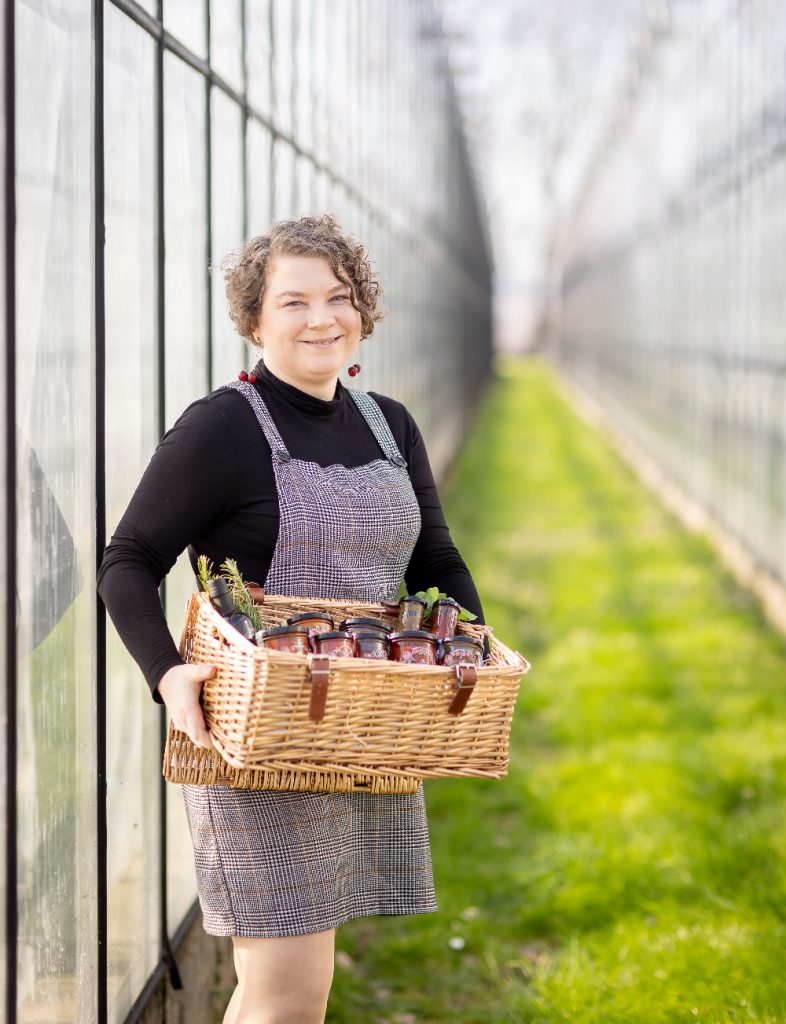
If you’ve sampled any of the Tomato Stall’s fourteen flavourful new products launched since the year 2020 (from green tomato ketchup to smoked tomato pesto) chances are, one talented lady has been instrumental in their creation – Agnieszka Debowksa – known to all as “Aggie”.
As a child in the eastern Polish city of Biała Podlaska (just half an hour from the Belarusian border), Agnieszka wanted to be an archaeologist. She read books, wrote stories and explored the history of her ancestors, being both three-quarters Polish and a quarter Tatar (an ethnic group closely related to Turkish people). However, that changed in her final year of high school, as Aggie suddenly became interested in genetically modifying plants to resolve vitamin deficiencies in poorer countries, going on to study biotechnology at Lublin’s Agricultural University.
As the Polish government banned plant modifications in her final year, Aggie moved abroad for work, first to a Portuguese blueberry farm before discovering a job advert for Arreton’s Tomato Stall. “I Googled the destination and the Island sounded like an amazing place to learn about British culture, with coastal paths, a quiet life and more sun than any other part of the UK. I arrived here in April 2011 and never left”.
From line leader to forklift truck driver, Agnieszka has worked at The Tomato Stall in a range of roles, knowing the business inside-out, which is why in 2019, she was offered the chance to join the development kitchen. Her first invention was the green tomato ketchup (using tomatoes normally wasted after pruning) and since then Aggie has used her experience and love of food instilled since childhood to create many more (with a few ‘secrets’ yet to be unveiled).
“My parents loved to cook and owned a chain of food outlets selling French fries with a huge variety of sauces imported from Belgium. It was quite innovative at the time as the only options in Poland before were ketchup and mayonnaise. I can still remember our family breakfasts too when my dad cooked the best bacon and scrambled eggs on earth, with a tomato and sour cream salad on the side.”
